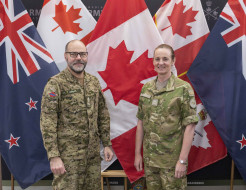
Today’s partnerships underpin tomorrow’s success
07 March 2025
Unfortunately you are viewing this website on an outdated browser which does not support the necessary features for us to provide an adequate experience. Please switch to a modern browser such as latest version of Google Chrome, Mozilla Firefox, Apple Safari or Microsoft Edge.
Ngā mihi nui
As a small nation, New Zealand depends on global stability for our security and prosperity.
It is easy to think that because we’re a long way from other countries, we are safe from the problems other countries have. We might feel that threats to peace elsewhere don’t affect us. But in a modern world, they do. New Zealand is vulnerable to disruption. A combat-capable Army that can detect, deter and counter threats to peace and security supports the resilience and well-being of our nation, as well as enabling us to contribute to our nation's obligations as an international citizen.
We don’t do this alone. New Zealand partners with other countries, such as Australia, the United Kingdom, the United States and Canada, to promote global security. Globally, there are more challenges. Different countries around the world are pursuing goals that are threats to peace. There are individuals who pursue extreme ideologies. Organised crime is international. Countries like New Zealand are stronger when we work with other countries to promote peace and security.
We are a small country, but there are others who are smaller and even more vulnerable. Just as large countries share the responsibilities, so too does New Zealand for our South Pacific neighbours. We are a Pacific Island country and what happens in the South Pacific directly affects our security and well-being. We have a constitutional responsibility to the Cook Islands, Niue and Tokelau. The New Zealand Army responds to events in the Pacific and undertakes security and stability operations on direction from the Government.
Why would they ask New Zealand for help? It’s in our history and in the way New Zealanders are viewed around the world. The world views New Zealand as a nation with people who want to do the right thing and help others. This culture is inherent in our Defence Force. We’ve been doing it for a very long time, often as part of an international team trying to prevent or resolve conflict, such as a part of United Nations initiatives. Sometimes it’s important enough to keep helping for years. We have long commitments to peace and security in Asia, the Pacific, and the Middle East.
These area some of our stories
Our other areas of work